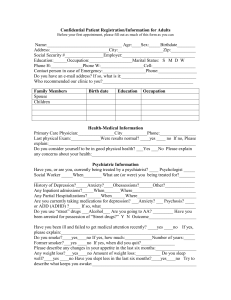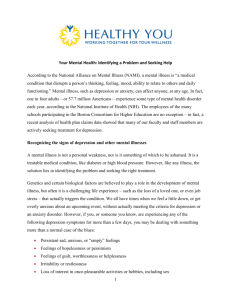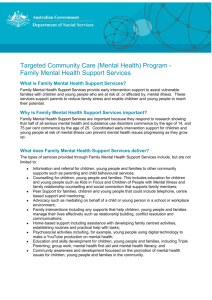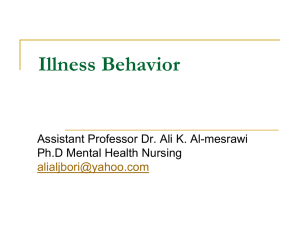Depression the curse of the strong
advertisement
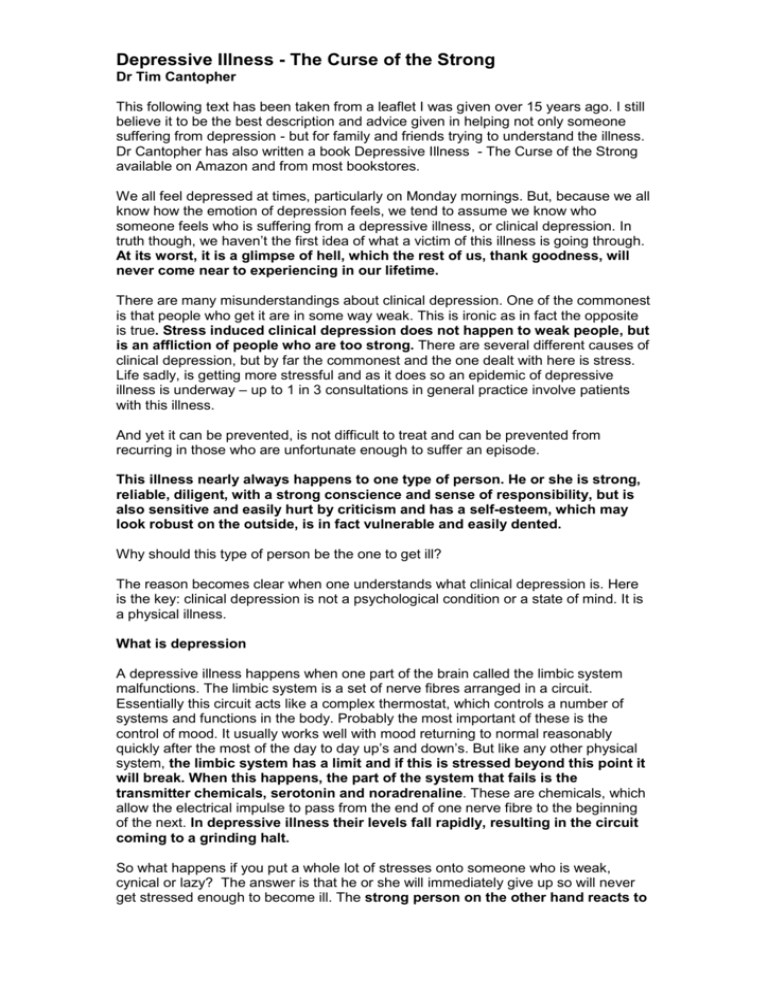
Depressive Illness - The Curse of the Strong Dr Tim Cantopher This following text has been taken from a leaflet I was given over 15 years ago. I still believe it to be the best description and advice given in helping not only someone suffering from depression - but for family and friends trying to understand the illness. Dr Cantopher has also written a book Depressive Illness - The Curse of the Strong available on Amazon and from most bookstores. We all feel depressed at times, particularly on Monday mornings. But, because we all know how the emotion of depression feels, we tend to assume we know who someone feels who is suffering from a depressive illness, or clinical depression. In truth though, we haven’t the first idea of what a victim of this illness is going through. At its worst, it is a glimpse of hell, which the rest of us, thank goodness, will never come near to experiencing in our lifetime. There are many misunderstandings about clinical depression. One of the commonest is that people who get it are in some way weak. This is ironic as in fact the opposite is true. Stress induced clinical depression does not happen to weak people, but is an affliction of people who are too strong. There are several different causes of clinical depression, but by far the commonest and the one dealt with here is stress. Life sadly, is getting more stressful and as it does so an epidemic of depressive illness is underway – up to 1 in 3 consultations in general practice involve patients with this illness. And yet it can be prevented, is not difficult to treat and can be prevented from recurring in those who are unfortunate enough to suffer an episode. This illness nearly always happens to one type of person. He or she is strong, reliable, diligent, with a strong conscience and sense of responsibility, but is also sensitive and easily hurt by criticism and has a self-esteem, which may look robust on the outside, is in fact vulnerable and easily dented. Why should this type of person be the one to get ill? The reason becomes clear when one understands what clinical depression is. Here is the key: clinical depression is not a psychological condition or a state of mind. It is a physical illness. What is depression A depressive illness happens when one part of the brain called the limbic system malfunctions. The limbic system is a set of nerve fibres arranged in a circuit. Essentially this circuit acts like a complex thermostat, which controls a number of systems and functions in the body. Probably the most important of these is the control of mood. It usually works well with mood returning to normal reasonably quickly after the most of the day to day up’s and down’s. But like any other physical system, the limbic system has a limit and if this is stressed beyond this point it will break. When this happens, the part of the system that fails is the transmitter chemicals, serotonin and noradrenaline. These are chemicals, which allow the electrical impulse to pass from the end of one nerve fibre to the beginning of the next. In depressive illness their levels fall rapidly, resulting in the circuit coming to a grinding halt. So what happens if you put a whole lot of stresses onto someone who is weak, cynical or lazy? The answer is that he or she will immediately give up so will never get stressed enough to become ill. The strong person on the other hand reacts to stress by redoubling their efforts, pushing themselves way beyond the limits for which their body is designed. When they start to get symptoms, because of he / she is sensitive and fears criticism and failure they keep going, with the inevitable result that eventually something must give way. What gives way is the limbic system. If you put 18 amps through a 13-amp fuse, there is only one possible result. Stress related depressive illness is essential a blown fuse. The symptoms of clinical depression (you don’t have to have all of them to have the illness) are depressed mood, feeling worst in the morning and better as the day goes on and a host of “loss-of’s” This is loss of : Sleep Appetite Energy and enthusiasm Concentration Confidence and self esteem Sex drive Drive Enjoyments Patience Feelings Optimism And almost anything else you can imagine; pretty much everything goes. So you have identified that you are ill, what do you do now? How to you recover? Exactly the same as you would with any other physical illness, rest and take the prescribed treatment. The trouble is that on the whole the people who develop this condition have overcome every problem they have encountered in their life by redoubling their efforts. The concept of giving into the illness is an anathema. Yet you wouldn’t try to overcome pneumonia through exercise or resourcefulness. Neither can you with clinical depression. Beware of family and friends. They will often give you the benefit of their home spun wisdom: “Go on pull yourself together, get more interests, get out more, get more friends, come and have a party we will cheer you up”. If you take this advise you will get worse. Rest, especially in the early stages is crucial. This does not mean going to bed or sitting in a chair doing nothing, that would give you far too much time to ruminate. It does mean avoiding any unnecessary challenges and only, where possible, doing what is easy. If it is possible to take time off work do so. If you can get someone to clean up, look after the kids and do other chores do so. Cancel social events that you are not looking forward to. Watch more TV or do anything that comes easily to you. Medication Another difficult issue is anti-depressant medications. Whilst there is there is no doubt that they are an important part of treatment, they have a very mixed press and people hold strong views about them. Again many misunderstandings abound. Anti-depressants are not addictive, though if you come off them too quickly you get withdrawal symptoms; withdraw from them slowly under medical supervision, tapering the dose over several weeks at the appropriate time. They don’t work straight away and often take a few weeks to kick in properly. They do not give you a false high, or make you a better, more creative person, or turn you into a murdering psychopath. Above all if an antidepressant helps you get better don’t stop it as soon as you get well. It takes the limbic system several months to heal properly, even though the symptoms of clinical depression are gone. If you keep the drug going for long enough, you are unlikely to relapse when you come off it; in the same way that, when a plaster cast is taken off a broken leg which has healed, you can walk without a return of pain. Once recovery starts, things get a little more complicated. You need to start doing a little more, but how much? The truth is, I don’t know. But you do, because at every stage, your body will tell you. You can divide activity into three categories; mental, physical, and social. At your body’s physical limit at any point of recovery you will start to feel heavy and lethargic. For mental activity, you will find you don’t take anything in. At social events, you will find it difficult to communicate. At this stage or before stop. If you do you will continue to recover, if you don’t you will feel rotten for the next 36 hours or so. The harder you push recovery the slower it goes. Even following these instructions you will get up’s and down’s, but they will be minimized. At the beginning there aren’t many good days. In the middle of recovery some days are nearly back to normal and others almost as bad as ever. Beware of extremes of emotions during this period. Your first good day isn’t the end of your problems and the rotten days that follow doesn’t mean you will never be well. Don’t over do it on the good days, and don’t despair on the bad ones; this is normal recovery, and in any case the bad days are often a message that what you did yesterday you were doing too much. Why did it happen? Why Me? Once you are somewhere near full recovery, it is time to ask some basic questions such as: What is it all for? Do I have to run my life this way? Can I say “no” occasionally? What do I want from life? Why do I always have to be everything for everybody? Etc. Etc. These are difficult questions and there are probably many more. They involve identifying choices you have in your life and making them. If you don’t think you have any choices, because of your commitments and responsibilities you are wrong, but you may have to give up on your image of yourself as the perfect, mother / father / employee / friend etc. Help is available It isn’t always easy to identify this on your own. This is when a counselor, or psychotherapist comes in. There are many different forms of psychotherapy, but they can mainly be divided into exploratory (or psychodynamic), cognitive and behavioral. There is no right or wrong type, they all work for different people depending on their particular route into the illness. It is however important that you find someone you feel comfortable with, and if you don’t, don’t give up if you need help find someone else. The essential point though is that effective treatment isn’t a matter of drugs or change of lifestyle or psychotherapy, but is often a combination of all three. After that it is down to you, if you have changed the way you operate and maybe the way you think, you have a great chance of remaining not only well but happy too! TWELVE ESSENTIAL FACTS ABOUT DEPRESSIVE ILLNESS It is a physical, not a mental illness It happens to strong not weak people It is not the same as “feeling depressed” You don’t know how a person suffering from this feels unless you have had it yourself. You cannot just simply pull your self together It gets better eventually sooner or later It gets better quickest if you rest Anti-depressants are not addictive Anti-depressants usually take a few weeks to work Don’t stop taking your anti-depressants as soon as you feel better When recovering, increase your activity slowly as your body dictates In order to stay well following recovery, you will need to make changes to the way you operate, and possibly the way you think.

